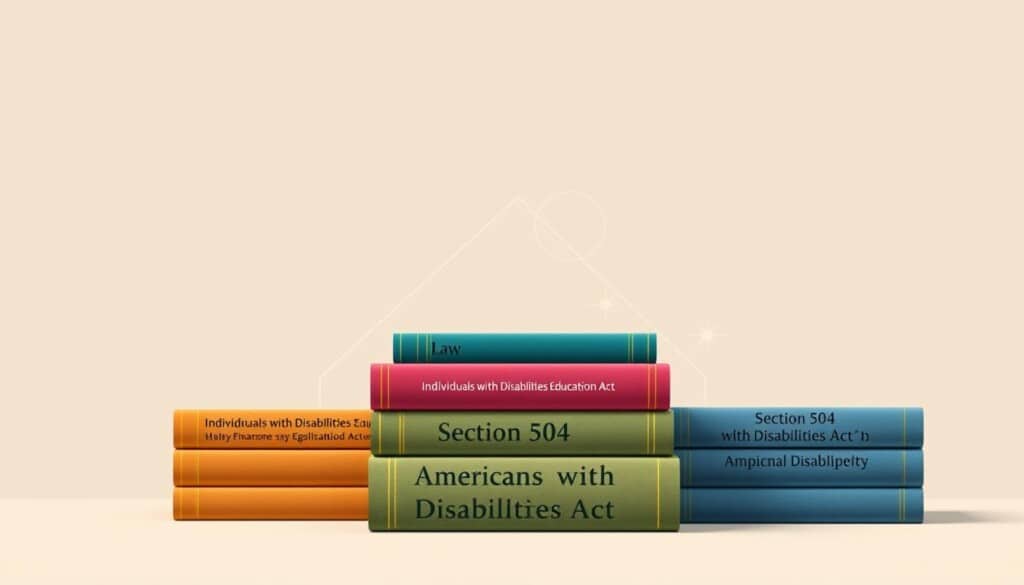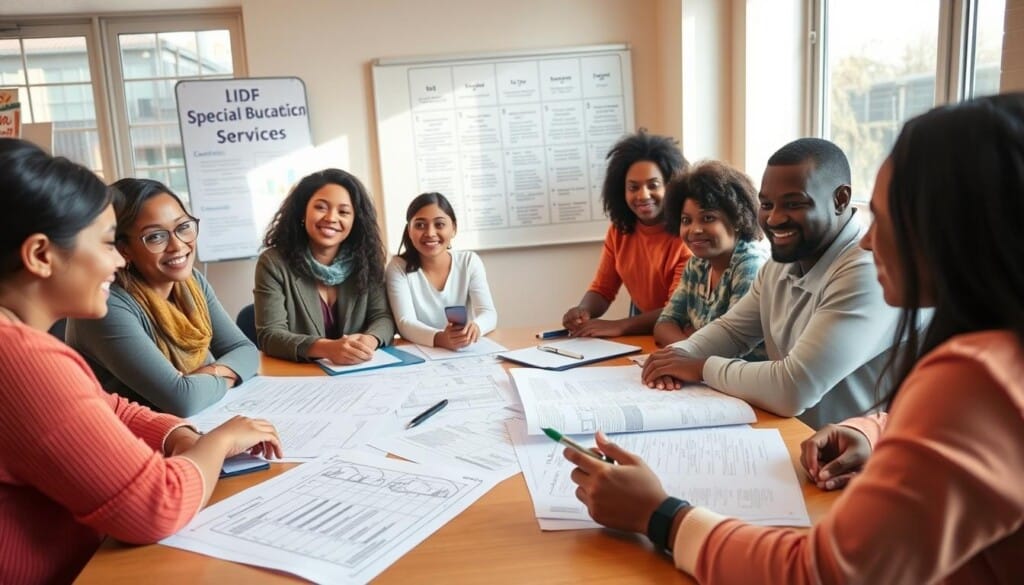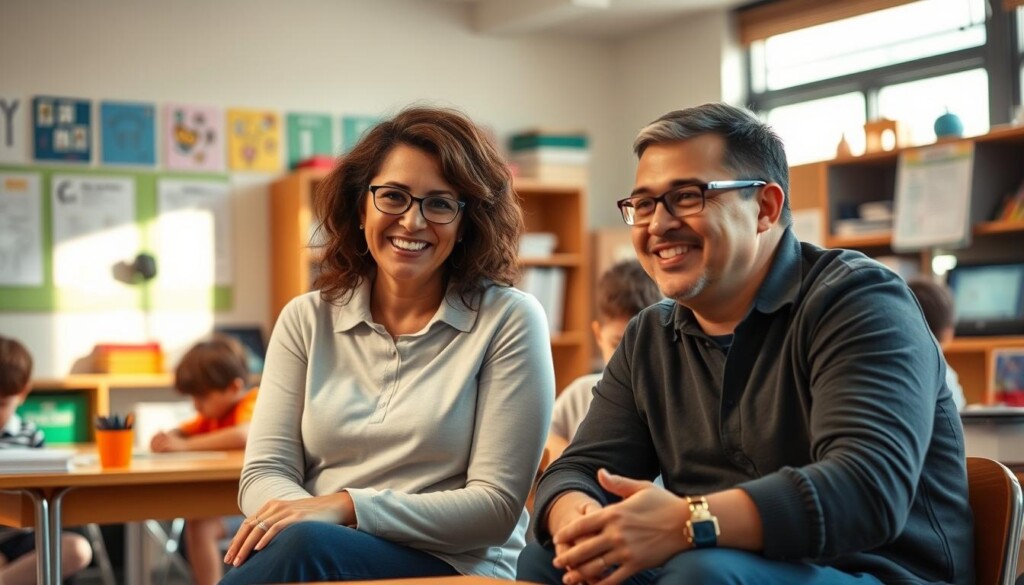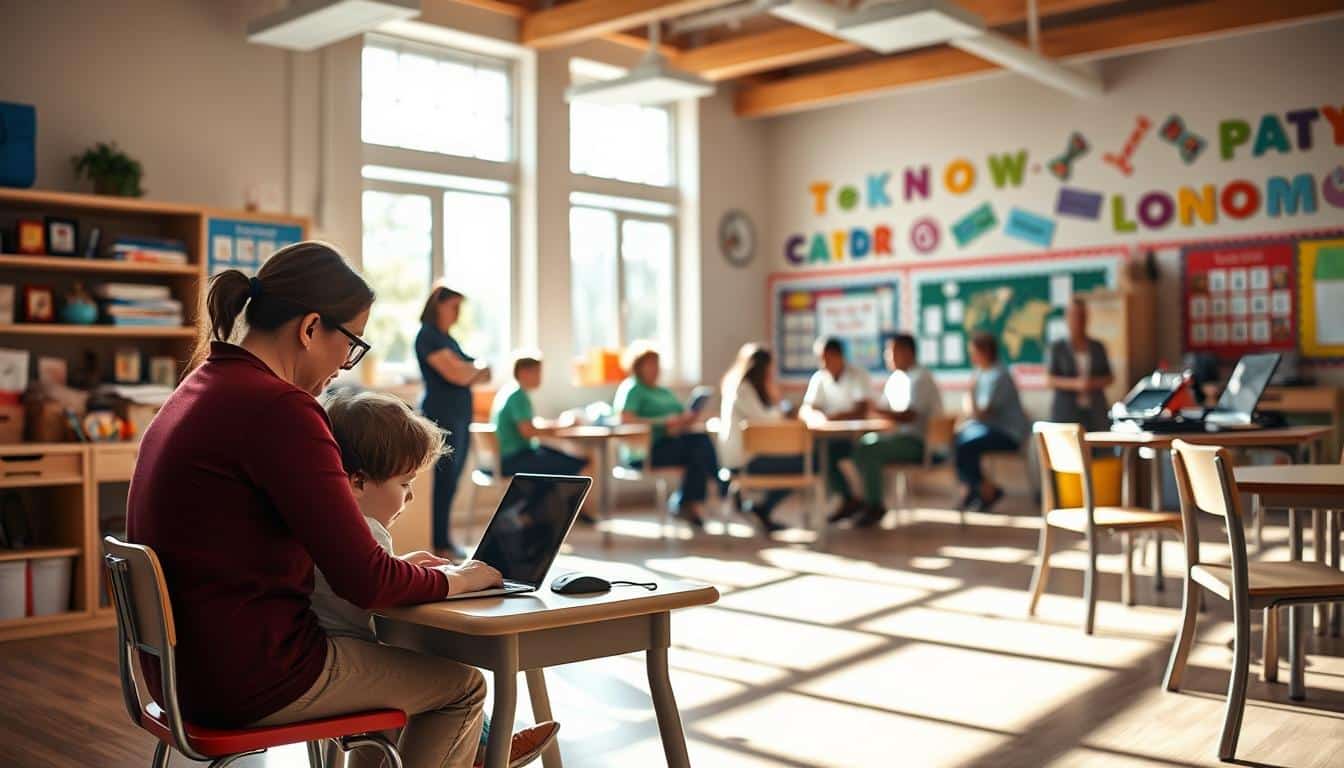Have you ever wondered if you’re ready to handle special education for your child? Supporting kids with special needs can feel like a big challenge. But, knowing about the important resources and systems can really help.
This section aims to shed light on special education. It focuses on the importance of inclusive education and the support parents need. By looking into key insights and resources, you’ll be better equipped to fight for your child’s needs. This way, they can get the support they deserve.
Key Takeaways
- Special education is key for inclusive learning environments.
- Knowing about resources can help parents advocate better.
- Individualized Education Programs (IEPs) are vital for tailored support.
- Legislation, like IDEA, affects the rights and services for special needs kids.
- Working together, parents and educators are essential for success in special education.
- Community resources, like LocalZ, can connect families with important support networks.
Understanding Special Education: An Overview
Special education helps kids with disabilities or special needs get the education they deserve. It’s a system made just for them, with lessons and services that fit their needs. Knowing about special education shows us its key ideas and how it works.
Definition of Special Education
Special education is about teaching students with disabilities in a way that works for them. It uses special strategies and tools to help them learn. This makes sure every child can do well in school.
Importance of Special Education
Special education is very important. It makes sure kids with special needs get the help they need to learn. It also helps them make friends and learn important life skills.
The Role of Individualized Education Programs (IEPs)
IEPs are key in special education. They are plans made just for each student. They list goals, special help, and learning strategies. IEPs help make sure students get the right education to succeed.
Key Legislation Impacting Special Education
Three key laws shape special education in the U.S. Each law covers different parts of education and the rights of those with disabilities. Knowing the Individuals with Disabilities Education Act, Section 504, and the Americans with Disabilities Act is key.
Individuals with Disabilities Education Act (IDEA)
The Individuals with Disabilities Education Act (IDEA) is a major law for special education. It makes sure students with disabilities get a Free Appropriate Public Education (FAPE). Schools must create an Individualized Education Program (IEP) for each student.
This helps students do well in school like their peers.
Section 504 of the Rehabilitation Act
Section 504 is also very important. It stops schools from discriminating against students with disabilities. It says schools must give students the help they need to learn.
This makes school a place where everyone can learn together.
Americans with Disabilities Act (ADA)
The Americans with Disabilities Act (ADA) adds more protection. It says everyone with disabilities should have the same chance in school, work, and public places. The ADA makes sure schools are open to everyone.

Types of Disabilities Covered in Special Education
Special education covers many types of disabilities. This helps teachers give each student the right support. The main areas include learning disabilities, emotional behavioral disorders, and physical disabilities.
Learning Disabilities
Learning disabilities make it hard to process information. Students might struggle with reading, writing, or math. But, this doesn’t mean they’re not smart. Teachers use special methods to help these students do well in school.
Emotional and Behavioral Disorders
Emotional and behavioral disorders affect how students feel and act in school. These can be anxiety, depression, or acting out. Teachers use special techniques and counseling to help these students.
Physical Disabilities
Physical disabilities can make it hard for students to move or learn in a regular classroom. They might need special tools or changes to the classroom. Schools make sure all students can learn by making things accessible.
The Process of Securing Special Education Services
Getting special education services starts with early steps. It includes early intervention, evaluation, and making an IEP that fits the child’s needs. Early help is key to spotting and helping with developmental issues early on.
Early Intervention Services
Early intervention helps young kids who might be falling behind. It focuses on improving communication, physical, and social skills. This support is given before kids start regular school, helping them get off to a strong start.
Evaluation and Assessment
The evaluation and assessment stage is very important. It helps figure out if a child needs special education. A team of experts looks at the child’s strengths and challenges. This helps teachers know how to best support the child.
Creating an IEP
After the evaluation, the next step is making an IEP. This document sets out goals, accommodations, and services needed for the child’s success. It’s a plan for teachers and families to help the child meet their unique needs.

Finding the Right Resources for Special Education
For parents, finding the right special education resources can be tough. There are many ways to get help, like educational consultants, local groups, and online sites. Each one has its own benefits for different families.
Educational Consultants
Educational consultants help families understand special education. They offer advice on tests, IEPs, and legal rights. Their expertise is key in making choices that fit your child’s needs.
Local Support Groups
Local support groups offer a community feeling. They provide emotional support and practical tips for special education. These groups are a big help, connecting families with others who understand.
Parents can find these groups through places like LocalZ. They offer workshops, events, and chances to meet others.
Online Resources
Online resources are full of helpful information for parents. Websites, forums, and libraries have articles, tools, and strategies. They are key for getting the latest on special education and meeting others.
The Importance of Parental Involvement
Parental involvement is key in special education. When parents get involved, they offer vital support and help talk to teachers. This teamwork is essential to meet a child’s unique educational needs.
Advocating for Your Child’s Needs
Understanding your child’s rights and resources is important. Parents need to know their child’s strengths and challenges. This knowledge helps them advocate for the right accommodations and services.
Collaborating with Educators
Working together with teachers is beneficial for a child’s education. Regular talks between parents and teachers help spot problems and celebrate successes. This teamwork ensures the child gets the right educational plan.
Building a Support Network
Having a support network is important for parents in special education. Connecting with other families and experts helps share resources and advice. This support boosts advocacy and teamwork, helping the child succeed in school.

Resources for Special Education in the United States
Finding the right resources is key to improving special education services. Families can tap into many national, local, and state resources. These tools help create a supportive learning environment for kids with disabilities.
National Resources
National groups offer important info, advocacy, and help for families. The National Parent Technical Assistance Center helps understand rights and processes. The Council for Exceptional Children also supports education for those with disabilities, helping both parents and teachers.
Local Resources via LocalZ
LocalZ is an online directory that connects families to local services. It helps parents find educational consultants, support groups, and special education help. This makes it easier to find the right resources and builds a sense of community.
State-Specific Organizations
Every state has its own groups to support families in special education. These organizations provide resources, advocacy, and help that fit local laws. Knowing and using these resources helps parents get the right services for their kids, ensuring they meet state standards and succeed in school.
Transitioning from Special Education to Adulthood
Transitioning from special education to adulthood is a big step for young people with disabilities. It involves getting ready for college or vocational training to become independent. Learning life skills is key to navigating adult life well.
Preparing for Post-Secondary Education
Getting ready for college needs a clear plan. Students should look into colleges with programs for their needs. They need to know about admission, support services, and how to speak up for themselves.
Workshops and seminars help a lot. They give insights into the transition, making students feel ready for what’s next.
Vocational Training Options
Vocational training has many paths for those not going to college. It teaches job skills for work. Working with local businesses for internships adds real experience.
Life Skills and Independence
Life skills are vital for independence after school. Training in finance, household tasks, and social skills is important. These skills help with daily life and living on your own.
Navigating Challenges in Special Education
Parents of children in special education face many challenges. These include bureaucratic hurdles, not understanding their rights, and poor communication with teachers. It’s key for parents to know their rights under the Individuals with Disabilities Education Act (IDEA) and other laws. This knowledge helps them fight for their child’s education needs.
Common Barriers for Parents
One big challenge is understanding the special education system. Parents often get wrong information about services for their kids. Different views on policies by school staff can cause confusion and frustration.
Understanding Your Rights
Knowing your rights is essential in special education. Understanding federal and state laws helps parents know what services their child should get. This knowledge can make advocating for their child’s needs less stressful.
Strategies for Overcoming Obstacles
To beat obstacles, parents can use several strategies. Building good relationships with teachers and school leaders helps a lot. It makes communication better and gets more support for the child. Also, joining local support groups can offer great help and advice from others in similar situations.
Community Involvement and Support Systems
Getting the local community involved is key for families with kids in special education. Local businesses play a big role, helping more than just with money. They offer discounts and sponsor events to raise awareness and education.
This makes families feel seen and supported.
The Role of Local Businesses in Supporting Families
Local businesses are vital for the community, helping families with special needs. They work with special education services, making a big difference. Their partnerships with schools and groups help spread support across the area.
Collaborations with Local Organizations
Teaming up with local groups makes community help even stronger. They host events and workshops, sharing important info. This helps families feel connected and supported, building a strong community spirit.
How LocalZ Connects Families and Resources
LocalZ is a key online tool for families. It connects them with local support and services for special education. This platform helps families find the help they need, building a supportive community.
Future Trends in Special Education
The world of special education is always changing. This is thanks to new technology and a focus on including everyone. Teachers and leaders are working hard to make learning better for all students. They want to make sure every student gets a great education, no matter their needs.
Advances in Technology for Learning
New tech is changing how students with disabilities learn. Tools like adaptive software and assistive devices help students learn in their own way. These tools make learning fun and help students feel more in control of their education.
By using technology, teachers can reach more students. This makes education more open to everyone.
Inclusive Education Practices
Inclusive education is also becoming more common. It means putting students with disabilities in regular classrooms. This helps everyone learn together and builds a supportive community.
By being inclusive, schools become more welcoming. This helps students feel accepted and helps them do their best.
Evolving Legislation and Policies
Changes in laws and policies are also important. These changes help make sure students with disabilities get the support they need. New rules aim to give families more help and resources.
These updates show a big commitment to helping students succeed. They help make sure every student gets the support they deserve.

